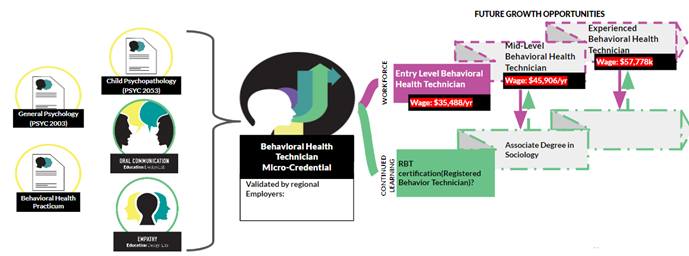Main Content Start

Micro-Credential
Behavioral Health Technician
Behavioral Health Technician
DESCRIPTION
The Behavioral Health Technician Micro-Credential prepares students to provide personal care services to patients under the guidance of clinical or nursing leadership. Students learn to care for and monitor individuals with challenging behaviors and mental and emotional conditions. They follow instructions from physicians and health practitioners, monitor patients' physical and emotional well-being, report observations to medical staff, and assist in rehabilitation programs and personal hygiene care.
Instruction Method
In Person
Skills Acquired
- Understanding of Human Psychology and abnormal psychology
- Crisis Management
- CPR/BLS and restraint certification
- Electronic Case Management
Course Names and Codes
To earn this credential, the following courses must be successfully completed.
General Psychology (PSYC 2003)
Child Psychopathology (PSYC 2053)
Behavioral Health Technician Practicum (TBD)
Durable Skills Awarded
Empathy
Oral Communication
Pre-requisites
None
Credits Earned
9 Academic Credits towards Associate degree in Psychology
Shortest Time to completion
4 Months Full Time
Behavioral Health Technician Micro-pathway

Learning Outcomes
- Fundamental Knowledge of Behavioral Health: Demonstrate an understanding of mental health conditions, their symptoms, and the principles of human behavior.
- Identify Childhood Psychological Disorders: Recognize the diagnostic symptoms associated with various childhood psychological disorders, including ADHD, Autism, behavioral disorders, anxiety disorders, and mood disorders.
- Understand Child Psychopathology: Demonstrate a comprehensive understanding of child psychopathology, including the DSM criteria, misdiagnosis, and the protective and risk factors influencing childhood mental health.
- Patient Care and Support: Apply effective communication techniques to engage with patients, providing compassionate support and assistance in daily activities.
- Crisis Intervention Skills: Recognize and respond to crisis situations, utilizing de-escalation strategies and appropriate intervention techniques.
- Treatment Planning and Documentation: Assist in the development and implementation of individualized treatment plans by maintaining precise records of patient interactions and treatment outcomes, while monitoring client progress and adjusting interventions as necessary to ensure effective treatment and regulatory compliance.
- Ethical and Legal Compliance: Adhere to ethical guidelines and legal requirements in behavioral health care, maintaining confidentiality and ensuring all documentation aligns with HIPAA standards.
Partner Employers
- TBD
- TBD
- YOU!